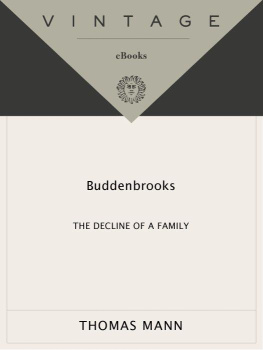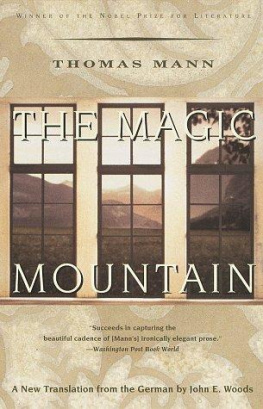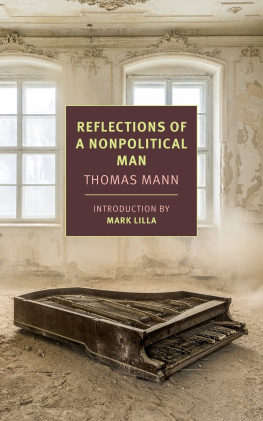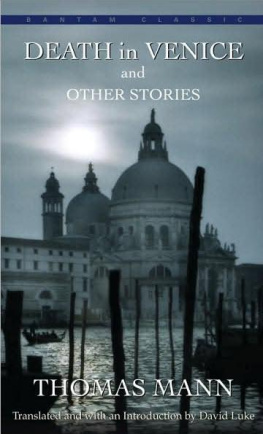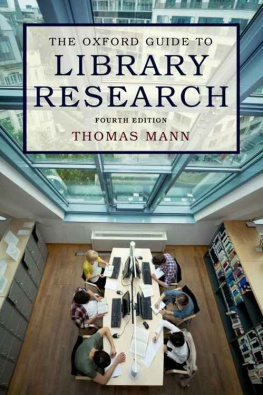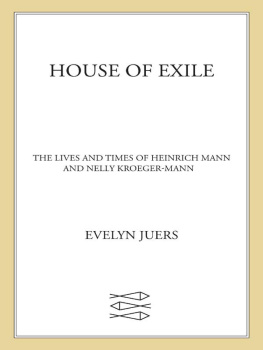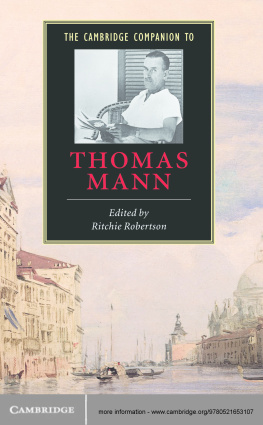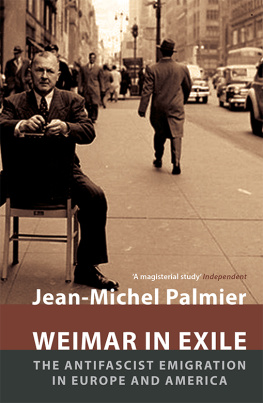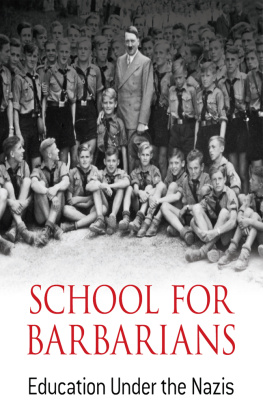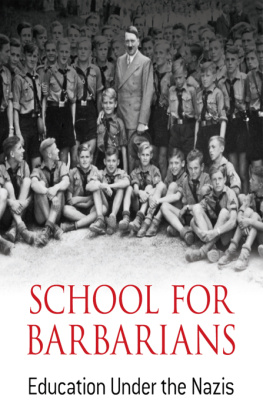
THOMAS MANN
THE CONFESSIONS OF FELIX KRULL CONFIDENCE MAN
The Early Years
translated by Denver Lindley
Original title: Bekenntnisse des Hochstaplers Felix Krull. Der Memoiren, erster Teil . Full original English title: Confessions of Felix Krull, Confidence Man: The Early Years . First published in German in 1954 and a year later in English.
Originally the character of Felix Krull appeared in a short story written in 1911. The story wasn't published until 1936, in the book Stories of Three Decades along with twenty-three other stories written between 1896 and 1929, the year in which he was awarded the Nobel Prize for Literature. Much later, Mann expanded the story and managed to finish, and publish part one of the Confessions of Felix Krull , but due to his death in 1955 the saga of the morally flexible and irresistible conman, Felix, remains unfinished.
PART ONE
CHAPTER
As I take up my pen at leisure and in complete retirement furthermore, in good health, though tired, so tired that I shall only be able to proceed by short stages and with frequent pauses for rest as I take up my pen, then, to commit my confessions to this patient paper in my own neat and attractive handwriting, I am assailed by a brief misgiving about the educational background I bring to an intellectual enterprise of this kind. But since everything I have to record derives from my own immediate experience, errors, and passions, and since I am therefore in complete command of my material, the doubt can apply only to my tact and propriety of expression, and in my view these are less the product of study than of natural talent and a good home environment. This last has not been wanting, for I come of a upper-class though somewhat dissolute family; for several months my sister Olympia and I were looked after by a Frulein from Vevey, though it is true she presently had to decamp because female contention arose between her and my mother, with my father as its object; my godfather Schimmelpreester, with whom I was on the most intimate terms, was a greatly admired artist whom everyone in our little town called 'Herr Professor' though it is doubtful whether he was officially entitled to this distinction; and my father, though corpulent, possessed much personal charm and always laid great stress on the choice and lucid use of words. He had French blood on his grandmother's side, had himself spent his student years in France, and, as he assured us, knew Paris like the palm of his hand. He was fond of sprinkling his conversation with French phrases such as 'c'est a', 'patant', 'parfaitement', and the like. To the end of his days he remained a great favourite with the ladies.
This only by way of preface and out of its proper sequence. As to my natural instinct for good form, that is something I have always been able to count on all too well, as my whole career of fraud will prove, and in the present literary undertaking I believe I can rely on it implicitly. Moreover I am resolved to employ the utmost frankness in my writing, without fear of being reproached for variety or impudence. For what moral value or significance can attach to confessions written from any point of view except that of truthfulness?
The Rhine Valley brought me forth that highly favoured and benign region, harsh neither in its climate nor in the quality of its soil, rich in cities and villages, peopled by a merry folk it must be among the sweetest regions of the habitable globe. Here, sheltered from rough winds by the mountains of the Rhine district and happily exposed to the southern sun, flourish those famous communities whose very names make the winebibber's heart rejoice Rauenthal, Johannisberg, Rdesheim and here, too, is that favoured town in which, only a few years after the glorious founding of the German Empire, I first saw the light of day. It lies slightly to the west of the bend the river makes at Mainz. With a population of some four thousand souls, it is renowned for its sparkling wines and is one of the principal ports of call for the steamers plying up and down the Rhine. Thus the gay city of Mainz was very near, as were the Taunus Baths, patronized by high society Homburg, Langenschwalbach, and Schlangenbad. The last could be reached in a half-hour trip by narrow-gauge railway. How many summertime excursions we made, my parents, my sister Olympia, and I, by boat, by carriage, or on the train! Enticements lay in every direction, for nature and human ingenuity had everywhere provided charms and delights for our enjoyment. I can still see my father in his comfortable checked summer suit as we sat in the garden of some inn a little way back from the table because his paunch prevented him from drawing up close immersed in his enjoyment of a dish of prawns washed down by golden wine. My godfather Schimmelpreester was often with us, keenly studying people and landscape through his big artist's glasses and absorbing both great and small into his artist's soul.
My poor father owned the firm of Engelbert Krull, makers of the now discontinued brand of champagne Loreley extracuve. Their cellars lay on the bank of the Rhine not far from the landing, and often as a boy I used to linger in the cool vaults, wandering pensively along the stone-paved passages that led back and forth between the high shelves, examining the array of bottles, which lay on their sides in slanting rows. 'There you lie,' I thought to myself (though of course at that time I could not give such apt expression to my thoughts), 'there you lie in the subterranean twilight, and within you the bubbling golden sap is clearing and maturing, the sap that will enliven so many hearts and awaken a brighter gleam in so many eyes! Now you look plain and unpromising, but one day you will rise to the upper world magnificently adorned, to take your place at feasts, at weddings, to send your corks popping to the ceilings of private dining-rooms and evoke intoxication, irresponsibility, and desire in the hearts of men.' So, or approximately so, spoke the boy; and this much at least was true, the firm of Engelbert Krull paid unusual attention to the outside of their bottles, those final adornments that are technically known as the coiffure. The compressed corks were secured with silver wire and gilt cords fastened with purplish-red wax; there was, moreover, an impressive round seal such as one sees on ecclesiastical bulls and old state documents suspended from a gold cord; the necks of the bottles were liberally wrapped in gleaming silver foil, and their swelling bellies bore a flaring red label with gold flourishes round the edges. This label had been designed for the firm by my godfather Schimmelpreester and bore a number of coats of arms and stars, my father's monogram, the brand name, Loreley extracuve, all in gold letters, and a female figure, arrayed only in bangles and necklaces, sitting with legs crossed on top of a rock, her arm raised in the act of combing her flowing hair. Unfortunately it appears that the quality of the wine was not entirely commensurate with the splendour of its coiffure.
'Krull,' I have heard my godfather Schimmelpreester say to my father, 'with all due respect to you, your champagne ought to be forbidden by law. Last week I let myself be talked into drinking half a bottle, and my system hasn't recovered from the shock yet. What sort of vinegar goes into that brew? And do you use petroleum or fusel oil to doctor it with? The stuff's simply poison. Look out for the police!' At this my poor father would be embarrassed, for he was a gentle man and unable to hold his own against harsh criticism.
'It's easy enough for you to laugh, Schimmelpreester,' he would reply, gently stroking his belly with his fingertips in his usual fashion, 'but I have to keep the price down because there is so much prejudice against the domestic product in short, I give the public something to increase its confidence. Besides, competition is so fierce, my friend, I'm hardly able to go on.' Thus my father.
Next page

